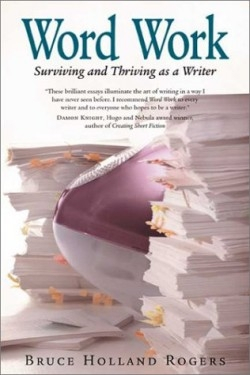Word Work
Surviving and Thriving as a Writer
Robert Pirsig’s Zen and the Art of Motorcycle Maintenance received over a hundred rejections before it became a best seller. This fact helps many writers not take rejection personally, but the author of this writing book argues that taking rejection personally can be healthy. It’s useful to figure out why the editor decided not to use it. Did it just not fit with the other material the magazine was publishing that month, or were there places where the story could be improved?
Rogers does not offer advice on how to write so much as on how to be a writer. There are no exercises for improving adjective selection, fixing long-winded sentences, or tidying up ambiguous paragraphs. Instead, he discusses setting up rituals to prepare for writing, balancing a writing career with family relationships, and coping with rejection.
According to Rogers, a transition state between the non-writing part of life and the writing part can prepare the psyche to begin work. For example, Thornton Wilder would take long walks, May Sarton would write letters or poetry, and Ernest Hemingway would sharpen twenty pencils before beginning to write. Rogers himself spends five minutes in the morning examining various objects on his dresser top that hold symbolic meaning for him.
Throughout this book, Rogers rounds out his advice by remembering the flip side to each of his issues. The opposite of rejection is acceptance, and that too must be taken personally and not taken personally. Writers should enjoy the fact that an editor wants to share their work with her audience, but be savvy enough to examine the deal she is offering.
The advice in this book is compiled from a column Rogers wrote for Speculations magazine, sharing the lessons he learned from writing his own mystery, crime, and science fiction stories, as well as years of teaching writing at the university level. He has won a Pushcart Prize, a Bram Stoker Award, and two Nebula Awards. For any writer searching for answers to the more personal side of the writing craft, this book serves as a useful guide and energizer. It shows multiple sides of issues and reminds readers that every writer approaches writing in a different way.
Most importantly, one must remember to be oneself. Rogers tells a story about Rabbi Zusya of Hanipoli. The Rabbi said, “In the coming world they will not ask me: ‘Why were you not Moses?’ They will ask me: ‘Why were you not Zusya?’”
Disclosure: This article is not an endorsement, but a review. The publisher of this book provided free copies of the book to have their book reviewed by a professional reviewer. No fee was paid by the publisher for this review. Foreword Reviews only recommends books that we love. Foreword Magazine, Inc. is disclosing this in accordance with the Federal Trade Commission’s 16 CFR, Part 255.

